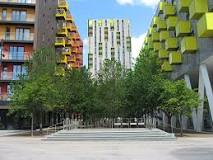Richard Tromans, policy manager in the efficiency team, talks about his recent connecting experience with London Borough of Barking and Dagenham Council (LBBD). The local authority has a number of challenges with rapidly changing demographics and high deprivation.
The placement started at the Heathlands Day Centre meeting with the Manager of Adult and Community Services and service users with profound and multiple learning disabilities. The facilities at the Centre include a hi-tech multi-sensory room projecting images that service users could interact with, a soft play area, a music room and an art room. The Centre encourages its service users to either volunteer or do paid work there, which appeared to be very beneficial.
One man, employed by the centre, explained how it had transformed his life and given him a sense of purpose and pride in what he was doing. The service users vary enormously in their abilities to communicate. Many are unable to speak, so staff at the Centre need to be able to communicate at different levels, including non-verbally. We observed a Tacpac session, a sensory communication method that used touch and music. The difficulties people faced were enormous, but I was impressed by the way that the Centre was able to adapt to meet the needs of new users, and there was clearly a strong connection between the staff and the service users.
Next stop was the Kallar Lodge Centre, which offers residential accommodation for people aged 65 and over with dementia and Deprivation of Liberty Safeguards. Very different from Heathlands, but the clear bond between staff and residents was again evident. We were introduced to a number of residents, and over a game of skittles, they recounted their stories from the past, including one who had dined with the Queen.
I noticed a lot of red around the building, and the manager explained the colour was more likely to be remembered by residents. She also explained how they were looking to further transform the corridors by installing replica daylight panels. Most residents appeared to be content talking, playing games or knitting, but one man appeared to find it very difficult adjusting to no longer having control of his own affairs and finances. Previous attempts to introduce artificial money had been unsuccessful – so work in progress!

The day finished at the Health and Wellbeing Board. The Board discussed a number of issues including the delivery of children’s social care, sustainability and transformation plans, funding constraints and new ways of working. I was particularly interested to learn of the work taking place in Care City, which was a joint venture between the North East London NHS Foundation Trust and LBBD, to deliver better outcomes, regenerate the region and improve the health and social care delivery through innovation, integration and investment. This included managing demand by encouraging older people to utilise technology to make straight forward choices.
Day two began discussing what we had observed the previous day with the Commissioning and Projects Manager for Children’s Social Care, before visiting a purpose built care home in Barking for residents with learning difficulties. With a member of staff, we helped organise a 70th birthday party for one resident including her invitation list, food, decorations and music. She seemed very excited about her party – when we got to the music options we were quite surprised to find that she was a fan of heavy metal!
Our final stop was the Abbey Leisure Centre, which the Commissioning Programme Manager explained supports public health outcomes and social care. Data collected by the leisure centre helps inform their approach - for example, the children’s soft play area incorporates both the colours black and white, the colours symbolising the children playing in it. The Healthy Lifestyles Team outlined their approach to preventing and managing obesity and other health issues.
They have programmes in place to educate children on nutrition and health, and to reinforce the message throughout their lives, and are building links with community groups to create community champions to ensure sustainability.
The opportunity to see, and to talk to end users and staff about the councils work, challenges and the innovative ways in which it is addressing these challenges was a really valuable experience.